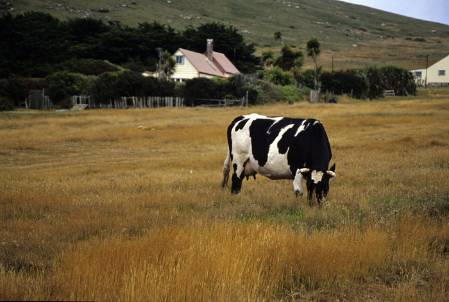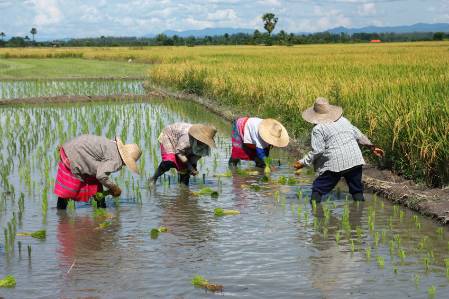While many of us here in the UK feast our eyes on an appetising array of food and cookery TV shows and our stomachs on pre-prepared foods, and as our kids are tempted by ever-more cunningly-named cereals from Kraves to Choc'n'Roll, it's hard to reconcile ourselves to the hard facts of food production and sustainability. Probably because we want this basic ingredient of life to remain a sensory object of our desires rather than an everyday concern.
By 2050, to feed the estimated world population of 9 billion, we'll need an annual production of around 3 billion tonnes of cereal and 200 million tonnes of meat. Image © Ellen Goff
But for nearly 1 billion people - one in seven - there simply isn't this luxury as they do not have enough to eat each day. And many more suffer from malnutrition, despite the fact that every human being has a right to adequate food. (I sometimes wonder why some clever bod hasn't come up with a way to recycle and preserve unused food that's chucked out daily from our households, restaurants and workplaces, and which could be supplied somehow to hunger hotspots. Here in the UK we throw away an astonishing 7.2 million tonnes of consumable food and drink each year - enough to fill 4,200 Olympic-sized swimming pools!)
The UN's Food and Agriculture Organisation (FAO) estimates that by 2050 we will need to increase agricultural production by 70 per cent to meet the food demands of a suggested 9.1 billion population (one that is about 34 per cent higher than that of today). But will there be enough land, water and genetic biodiversity to meet the demands?
The FAO also estimates that only about a dozen species of animals provide 90 per cent of animal protein we consume globally, and only four crop species give us half the plant-based colonies in our human diet. Conversely, the gene pool in plant and animal resources and natural ecosystems, which breeders need, is known to be diminishing. In the future we may be encouraged to be more vegetarian or reconsider genetically modified foods such as in vitro meat on our menu. Our breeders and farmers may be asked for alternatives to single crops and to re-evaluate the benefits of industrial as opposed to family farmng. As more people move to the cities, there may need to be more institutionalised plans in place for rural agriculture.
Is there enough water for the crops of the future? Will the need for staple grain crops decline in an increasingly industrialised world? These and other key concerns of food security and production will be discussed tonight in our fourth Earth Debate at the Museum.
And how will factors like a much larger urban population and the associated rise in supermarket culture, climate change and biofuels impact on our food security? In what ways can we balance the uneven distribution of resources and the over-nutrition of developed, more industrialised societies with the malnutrition of poorer communities? How much of the problem is one of production rather than managing wastage and taking over more land? And what of population growth checks?
These paradoxes of food and our future food security are the subject tonight of our fourth and final Earth Debate to be webcast and hosted in the Museum's Attenborough Studio and we need your thoughts on the subject too. Stakeholders Forum for a sustainable future will feed - scuse the pun - the discussions on to the big Rio+20 UN Conference on Sustainable Development in June.
On the panel are Sue Dibb, Executive Director of the Food Ethics Council, Barry Gardiner, MP and Chair of the All Party Parliamentary Group on Biodiversity, John Ingram, Food Security Leader at the Natural Environment Research Council and Camilla Toulmin, Director of the International Insititute for Environment and Development. The BBC's Richard Black will be chairing and, as with the previous debates, an invited audience and submissions via #earthdebates on Twitter will lead the questions to the panel.
Watch the Food security: how do we feed 9 billion people in 2050 debate live online at 19.00 BST tonight. If you can't tune into the webcast, we'll also be live-tweeting from @NHM_Live starting at approximately 18.50 or you can follow #earthdebates.
See the other debates online
Find out more about our Earth Debates
Read the Food and Agriculture Organisation's food security report




